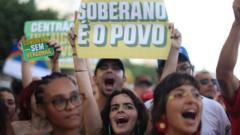Could Bolsonaro's Amnesty Bill Spark a Nationwide Outcry in Brazil?

Published: 2025-09-22 11:55:19 | Category: world
Massive protests erupted across Brazil as tens of thousands took to the streets to oppose a controversial bill that could grant amnesty to former President Jair Bolsonaro, recently sentenced to 27 years for plotting a coup. The demonstrations reflected widespread discontent over potential legal protections for politicians and heightened divisions within Brazilian society.
Last updated: 16 October 2023 (BST)
Key Takeaways from the Protests
- Tens of thousands protested against a bill potentially granting amnesty to Jair Bolsonaro.
- The proposed legislation also aims to make criminal proceedings against lawmakers more difficult.
- President Lula has stated he would veto the amnesty bill if it reaches his desk.
- The protests highlight Brazil's ongoing political divisions and public sentiment regarding Bolsonaro's actions.
- Supporters of the bill argue it protects lawmakers from judicial overreach.
The Context of the Protests
The protests that unfolded on Sunday were a response to a bill fast-tracked by Bolsonaro's allies in the Chamber of Deputies. This bill seeks to protect him and his co-defendants from imprisonment related to their actions during and after the 2022 presidential election. Bolsonaro was convicted earlier this month for conspiring to overthrow the government, and he currently remains under house arrest while appealing his sentence.
The "Banditry Bill" Explained
The controversial legislation has been dubbed the "Banditry Bill" by critics who argue it would undermine the rule of law. The bill requires that lawmakers approve, through a secret ballot, any criminal charges against their peers, potentially shielding them from prosecution. Proponents maintain that it is necessary to protect lawmakers from what they describe as judicial overreach, arguing that it is essential for the integrity of the legislative process.
Political Reactions and Support for the Protests
The demonstrations were buoyed by support from a coalition of trade unions, social organisations, and left-wing political parties, all united in their opposition to amnesty for Bolsonaro. During the protests, crowds chanted slogans such as "no amnesty" and displayed placards accusing Congress of shamelessness. Notably, prominent Brazilian musicians entertained attendees, contributing to the event's vibrant atmosphere.
President Lula's Position
President Luiz Inácio Lula da Silva expressed solidarity with the demonstrators, affirming his stance against the potential amnesty for Bolsonaro. Lula took to X (formerly Twitter) to declare, "I stand with the Brazilian people. Today's demonstrations show that the population does not want impunity or amnesty." He has pledged to veto any amnesty bill that passes through the Senate, reinforcing his commitment to justice and accountability.
The Divided Landscape of Brazilian Politics
These protests are indicative of the deep divisions within Brazil regarding Bolsonaro's legacy and the ongoing judicial proceedings against him. Two weeks prior, Bolsonaro's supporters had also rallied, condemning the legal actions taken against their former leader. This stark contrast in public sentiment illustrates the polarized state of Brazilian politics, with significant portions of the population firmly on opposing sides.
Judicial Findings Against Bolsonaro
A majority of justices in Brazil's Supreme Court concluded that Bolsonaro and his co-defendants had attempted to cling to power following his electoral defeat to Lula in 2022. Their actions culminated in the infamous storming of Congress, the Supreme Court, and the presidential palace on 8 January 2023, resulting in over 1,500 arrests. Many of those arrested received substantial prison sentences, further fueling the push for amnesty from Bolsonaro's Liberal Party.
Public Sentiment and Polling Data
Recent polling data from Datafolha, conducted in mid-September, reveals that public opinion is sharply divided over Bolsonaro's fate. Approximately 50% of respondents believe he should be imprisoned, while 43% oppose this. This division is reflective of broader national sentiments regarding democracy and accountability in Brazilian governance.
What Happens Next?
The proposed constitutional amendment will now move to the Senate, where its fate remains uncertain. The outcome is likely to hinge on the political dynamics at play, including the support Bolsonaro can muster from his allies. If the amendment passes, it may further entrench the divisions within Brazilian politics and challenge the foundations of the judicial system.
Conclusion: The Future of Brazilian Democracy
The protests against the potential amnesty for Bolsonaro signal a significant moment in Brazil's ongoing struggle for democracy and accountability. As the political landscape continues to evolve, the actions taken by lawmakers and the response from the public will play a pivotal role in shaping the future of governance in Brazil. The nation stands at a crossroads, facing the question of whether it will uphold the rule of law or succumb to political expediency.
FAQs
What is the "Banditry Bill"?
The "Banditry Bill" refers to a proposed constitutional amendment that would require lawmakers' approval before any criminal charges could be brought against them, which critics argue undermines accountability.
What are the consequences of the protests?
The protests may influence political decisions regarding the proposed amnesty for Bolsonaro and could impact public sentiment towards lawmakers, potentially affecting their positions in future elections.
How has President Lula responded to the protests?
President Lula has publicly supported the protests, affirming that he would veto any amnesty bill for Bolsonaro, indicating a commitment to justice and accountability in Brazilian politics.
What sparked the protests?
The protests were sparked by the fast-tracking of a bill in Congress that could grant amnesty to former President Bolsonaro and his co-defendants, which many view as a threat to democracy.
What does the polling data say about public opinion on Bolsonaro?
Polling data from Datafolha indicates a divided public opinion, with 50% of respondents supporting imprisonment for Bolsonaro and 43% against it, reflecting the polarisation in Brazilian society.



